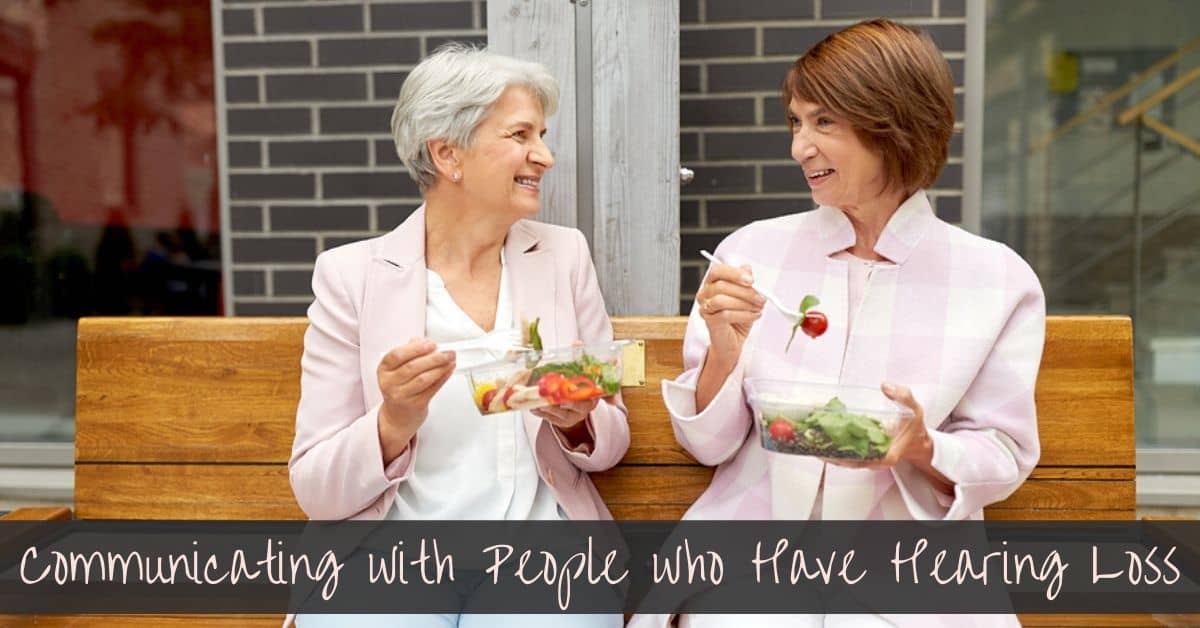
Listening to loss is an unseen problem. It is something that few people ever think about unless it directly affects them. As such, people can fail to do or say things that usually help the person with hearing loss understand better.
Another issue is that most people take shortcuts when communicating. People shorten sentences, use slang terms, mumble, or look away or cover their mouths while speaking.
Successful communication involves every person trying their best to be understood. Even with the use of hearing aids and active listening techniques, those who are involved in the communication process must use effective communication techniques regularly.
Studies also have shown that people interact better when they have revealed their condition to the person with hearing loss and offer tips about how to handle their hearing ability. But not everyone feels comfortable with sharing this knowledge, however, nor do they necessarily know what can make it easier for either party to converse.
If you have someone in your family or friendship circle with hearing loss, here are several things that you can do to improve communication with them.
1. Prepare yourself
Note that lipreading and following conversation when you’re experiencing hearing loss takes a lot of focus, which can be tiring, mainly when there’s background noise or everyone is talking at once.
The rates of background noise can also differ in public areas, like cafes, bars, and restaurants. Here are some ideas if you are considering a place to go for a meal or a drink with someone who has hearing loss.
- An area with carpets and soft furnishings would be quieter because they absorb sound and help minimize echo.
- Book your table away from the speaker and other noise systems.
- Well-lit venues are better for lipreading.
Before beginning the discussion, some other points to consider:
- Approach them from the side of the front so that they can see you.
- Before you start speaking make sure you have their attention, and maintain eye contact.
2. Initialize contact
Once the conversation is underway, there are things that you can do to make yourself more understandable.
- Do not shout from the next room. Not being able to see each other while communicating is a common factor. People find it difficult to hear what’s being said.
- Face a person with hearing loss directly, on the same level, and in a good light. Place yourself, so the sun is shining on your face and not behind you.
- Say the person’s name before beginning a conversation. It allows the listener to concentrate and reduces the risk of missed words at the start of the conversation.
- Talk at a regular pace and clearly. Avoid the urge to scream, which can lead to distorted speech, and make it harder to understand your words. Stop between sentences to help them process your words before continuing
- Do not use your hands or any other object to cover your face. Individuals with hearing loss rely on visual signals to help follow the conversation and may find lip reading helpful at times.
- Do not eat and drink as you converse. Talking with your mouth full is not just rude; it can make your words even harder to understand.
3. Check for understanding
Even if you follow all the tips above, don’t assume they have understood everything.
- Check for understanding by asking their opinion on what you’ve just said.
- When a person with a hearing loss misunderstands, consider rephrasing rather than repeating what you said.
- Write vital information down for them. Addresses, phone numbers, and spellings of names can be challenging to understand reliably. Send them a message or write a short note to ensure the information is right.
These are only a few of the possible tips to improve the conversation you have with someone with hearing loss. The most helpful strategies may depend on their degree of hearing loss and the environment in which you are in.
Urge them to get a hearing aid
If the person has a hearing impairment and is not seeking care yet, urge them to do so. Hearing loss affects many different aspects of our lives, including communication, our cognitive ability, and our health and wellbeing.
Treatment of hearing loss begins with a hearing test. We run comprehensive hearing tests as well as fittings for hearing aids. Call us today to arrange an appointment.
